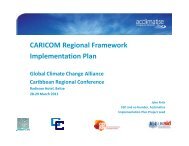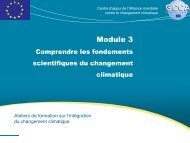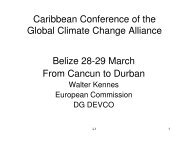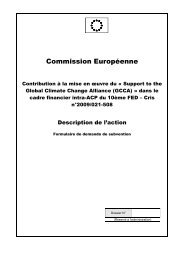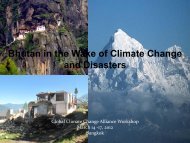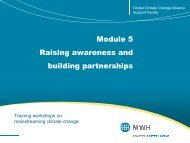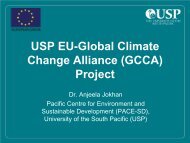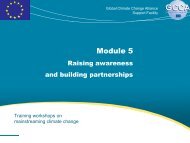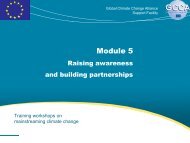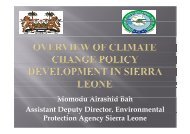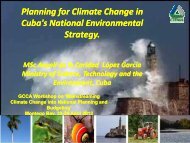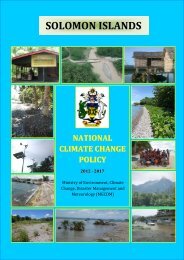Rwanda Green Growth Strategy 18nov11 - Global Climate Change ...
Rwanda Green Growth Strategy 18nov11 - Global Climate Change ...
Rwanda Green Growth Strategy 18nov11 - Global Climate Change ...
You also want an ePaper? Increase the reach of your titles
YUMPU automatically turns print PDFs into web optimized ePapers that Google loves.
Chapter 5Developing a NAMA for <strong>Rwanda</strong> may increase climate financing opportunities, and this <strong>Strategy</strong>would act as the foundation for the NAMA. Any emissions reduction commitments made by <strong>Rwanda</strong> in thefuture will need to be against a business-as-usual (BAU) baseline and the economic impacts must first becalculated. Any targets adopted should be contingent on financial and technical support from developedcountries. International climate finance is often channelled in an inefficient way through many different anduncoordinated intermediaries that bypass budgetary controls by national governments.Though significant, the international climate funding flowing into <strong>Rwanda</strong> will not be sufficient tofinance the <strong>Strategy</strong>. Thus, it will be crucial for the government to secure domestic sources of revenue andleverage private capital for low carbon and adaptation activities. FONERWA will be the centrepiece of<strong>Rwanda</strong>’s climate financing plan, attracting and streamlining climate finance with the <strong>Strategy</strong>, andleveraging private investment for low carbon initiatives. There is huge potential to attract private investment– both domestic investment and regional and global funds focusing on green economy investments - inmany of the programmes of action, as long as these are made commercially viable. To increase viability oflow carbon projects, <strong>Rwanda</strong> will investigate environmental fiscal reforms: taxes to make environmentallydamaging behaviour more expensive, and tax exemptions and subsidies to make environmentally beneficialbehaviour more attractive. Renewable energy technologies will be exempted from VAT and import duties,and feed-in tariffs will guarantee a market for renewable electricity sold onto the national grid byindependent power producers. Kigali’s new <strong>Green</strong> Special Economic Zone will investigate financial andfiscal incentives to companies to comply with voluntary energy efficiency and building standards; and in thelong-term a green investment index will be established in RDB to attract climate-friendly foreign directinvestment by ranking <strong>Rwanda</strong>n companies’ environmental and financial performance. On more riskyventures private capital can team up with Development Finance Institutions (DFIs) such as the EuropeanInvestment Bank (EIB), the World Bank, the African Development Bank, Belgium’s BIO, and Netherlands’sFMO.Low carbon projects will also seek funding from carbon markets, which allow projects that abateGHG emissions to raise funds by selling ‘carbon credits’. Mandatory emission reduction credits forGeothermal plants, micro hydro dams, organic composting stations, energy efficient buildings, improvedcookstoves, biogas digesters, etc, can generate emission reduction credits to be sold through mandatory/regulated markets such as the Kyoto Protocol’s Clean Development Mechanism (CDM). Forestry projectson the other hand, can generate credits to be traded through voluntary markets. The GoR willindependently implement several of these projects, and actively promote private implementation of othersby extending financial and technical support to ‘Implementing Entities’.In order to promote the preservation of ecosystems by individuals, communities and businesses,Payments for Ecosystem Services (PES) will be expanded beyond the pilot projects in Gishwati andNyungwe forests. REDD+, which encompasses Reducing Emissions from Deforestation and ForestDegradation (REDD), conservation and enhancement of forest carbon stocks and sustainable managementof forests, is the most advanced form of PES. However, <strong>Rwanda</strong>’s limited forest stocks, initial exclusionfrom the pilot programmes of the UN-REDD Programme and the Forest Investment Programme, significantreduction in deforestation in recent years, makes it less likely to access these funds than other countries.The priorities for the Finance Pillar are:Priority 1. Operationalise the National <strong>Climate</strong> and Environment Fund of <strong>Rwanda</strong>, FONERWAPriority 2. Secure grants from the <strong>Green</strong> <strong>Climate</strong> Fund, the Adaptation Fund and other climatefunds targeted at LDCs32Government of <strong>Rwanda</strong>



